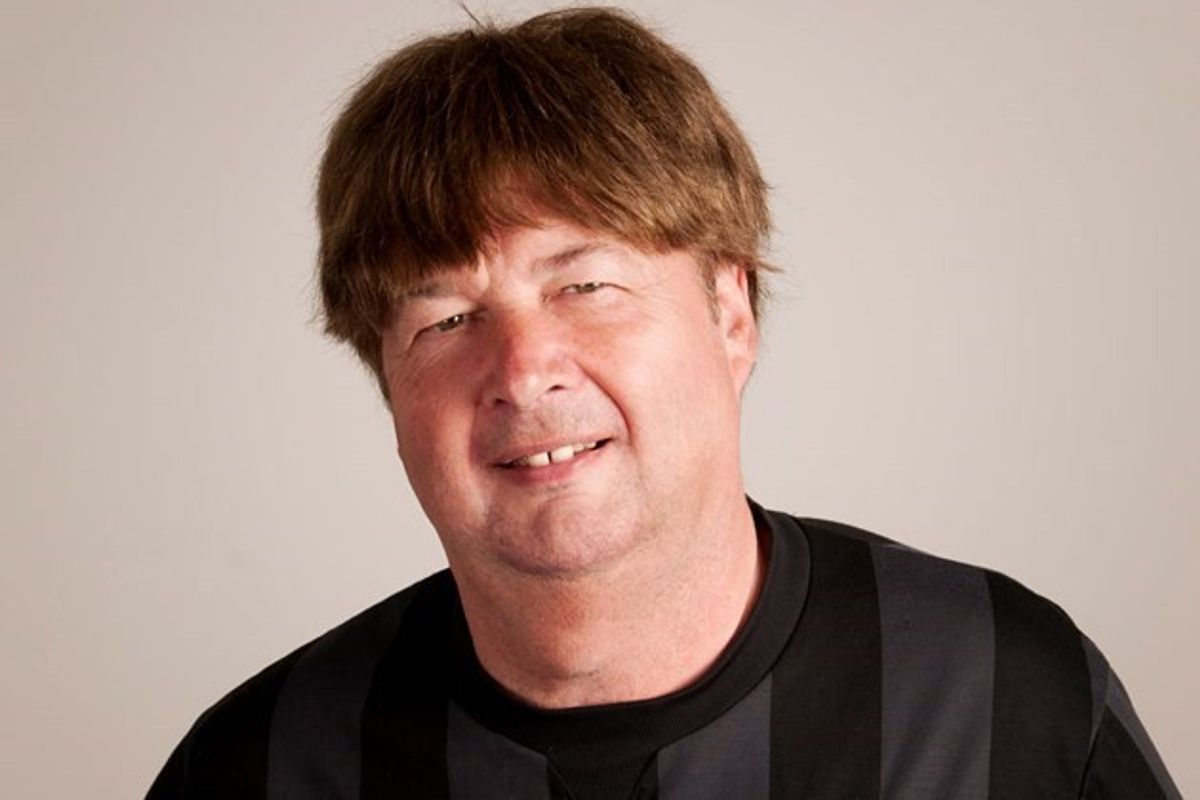Obituaries: Music Express Founder/Editor Keith Sharp, One Direction Singer Liam Payne
We also acknowledge the passing of American/Australian multi-instrumentalist and songwriter Alan Mansfield and Australian electronic music innovator and Michael Hutchence collaborator Ollie Olsen.

Keith Sharp
Keith Sharp, a Canadian music journalist and co-founder and editor in chief of influential monthly music magazine Music Express, died on October 18, after a short illness. He was 71 years of age.
Born in Manchester, England, Sharp emigrated to Canada in April 1967, on The Empress of England, and the family settled in Sault Saint Marie, Ontario.
His career in journalism started as a contributor to such regional papers as The North Bay Nugget while he studied journalism at Cambrian College, and was fully launched when, at age 18, he was hired by The Calgary Herald as a sports writer.
Sharp's lifelong passion for music soon spurred him to write music features for that paper as well, prompting him to launch his own music publication while remaining, temporarily, at that paper. In his memoir, Music Express. The Rise, Fall & Resurrection of Canada's Music Magazine (published by Dundurn Press in 2014), Sharp wrote that "Alberta Music Express was launched as a one-off tabloid in Calgary, Alberta in October 1976 by a 23-year old sportswriter for the Calgary Herald. It would expand, first as a tabloid chronicling Western Canada’s music confederacy. Then, having joined forces with 'The Dragon Lady' Conny Kunz in 1978, we eventually moved to Toronto in February 1980 to establish Music Express as 'The Pulse Of Canadian Music.'"
Sharp astutely observed that while the Canadian music industry was expanding significantly in the mid-1970s, "there still wasn’t a definitive media connection that linked this activity. When Alberta Music Express launched there were few other national music magazines. Vancouver’s Georgia Straight had been launched in the spirit of San Francisco’s Rolling Stone, RPM still stood firm as Canada’s only trade magazine and Toronto eventually had a mag called The New Music. But other than a few other fly by night papers, that was about it."
Once Sharp and Kunz, on board as publisher, relocated to Toronto to bring Music Express closer to the heart of the music industry, record label support grew, and it blossomed into Canada's largest monthly consumer magazine. It partnered with different record retail franchises across Canada for distribution and also became widely available on news stands. Kunz informs Billboard Canada that the average Canadian print run for Music Express (briefly renamed Rock Express) through the 1980s until its demise in 1993 was in the 50,000 copies range.
That number spiked dramatically in 1986, when, thanks to Sharp's chutzpah and powers of persuasion, Music Express signed a deal with the huge Musicland/Sam Goody chain of 1,100 record stores in the U.S. to serve as their in-house music magazine. A star-studded launch party was held in Los Angeles to celebrate. The highlight of that partnership came when a December 1987 issue of Music Express featuring Michael Jackson on the cover had a U.S. circulation of 1.2 million copies, likely the highest ever print run for a Canadian music magazine.
Major U.S. record labels certainly took note of those numbers, offering Keith Sharp and his staff and freelance writers participation in their promotional junkets in North America and around the globe, and securing interviews with the biggest artists of the day. [This article's writer, Kerry Doole, Billboard Canada FYI contributor Nick Krewen, and Billboard freelance contributor Karen Bliss, were among the writers who graced the pages.]
The strong Stateside presence of Music Express also proved of major benefit for Canadian acts seeking to break into that market. Sharp was a genuine cultural nationalist, always eager to boost the profile of Canadian artists across the border.
As part of the Musicland arrangement, Sharp recruited many top American freelance music journalists and authors to contribute regular reports on the music scenes of their cities. That list included Sylvie Simmons (Leonard Cohen's biographer) and Roy Trakin in Los Angeles, Tina Clarke in New York City, Holly Gleason in Nashville and Robert Gordon in Memphis. Music Express often also ran syndicated features from such noted English music scribes as Johnny Waller, Chris Twomey and Paul Suter.
Those glory days came to an end with the loss of Music Express' distribution agreement with Musicland-Sam Goody in 1990. Alternative U.S. circulation attempts did not survive, and the publication was taken over by new ownership in 1992.
A name change to Soundcan and then Impact followed, and Sharp was removed from his editor-in-chief role in early 1993. Former Music Express staffers then took ownership of Impact, publishing it as a nationally-circulated consumer magazine for three more years.
Undeterred by his situation, in 1994, Sharp created a new bi-monthly national magazine Access, one covering music, film and lifestyle topics that enjoyed a long run, until 2010.
After the demise of Access, Sharp decided to revive the Music Express brand as an online magazine and newsletter with a strong focus on Canadian rock, and it remained active until his passing. In his obituary/tribute to Sharp on the Music Express website, longtime contributor Roman Mitz reports that "Keith Sharp was the heart and soul of Music Express and the publication will not go on without him." Read that full tribute here.
During the halcyon days of Music Express in the 1980s, Sharp oversaw the launch of other magazines, including the heavy metal spinoff Metallion and custom publications for HMV, Jumbo Video and Walmart.
Alongside music, English football remained a lifelong passion for Sharp, a devoted Manchester City fan. While growing up in that city, Sharp was scouted as a prospect by Man City for his goalkeeping prowess, and he transported those skills to Canada.
In the early '80s, he organized a Music Express Rockers football team that played in a Toronto social league. Members of this motley crew at various stages included Rik Emmett of Triumph, B.B. Gabor, Frankie Venom of Teenage Head, David Quinton, John Gibb (Battered Wives), Mark Holmes of Platinum Blonde, David Bendeth, and various Music Express writers.
The Rockers side also participated in now-legendary matches against two superstar bands Sharp loved, Iron Maiden and Mötley Crüe. Sharp developed a close friendship with Iron Maiden and manager Rod Smallwood, a bond that deepened when Sharp learned that he was diagnosed with the same throat and neck cancer disorder Maiden singer Bruce Dickinson was afflicted with in 2014. Read an essay by Sharp on this subject here.
As word of Sharp's passing spread over the weekend, countless tributes were posted on social media by many notable Canadian musicians and industry figures, while Billboard Canada contacted others for comment.
On Facebook, music industry veteran and artist manager Ralph Alfonso (Attic Records, BongoBeat, The Damn Truth) posted this tribute: "Sad to hear of the passing of Keith Sharp, a pioneer in Canadian publishing, especially for the highly influential Music Express which was kind of Canada's answer to the U.K. mags like Melody Maker/Sounds/NME, and later his various specialty mags like Metallion (for which I did the Mr. Metal advertorial page), HMV mag, Access, etc.
"Outside of trade papers and local weeklies in the late '70s and 1980s, there was no national music paper to hype Canadian music and Keith (and partner Conny Kunz) really paved the way for Exclaim! today. Music Express was an incredible breeding ground for lots of great writers and photographers who got their start in one of Keith's magazines. I had fun pitching Keith and his various editors during my time as a promo weasel.
"Keith revived Music Express a few years ago as an online site and newsletter; one of the last places to still cover Canadian classic rock acts. Like all things from Canada's musical past, any online search of Music Express comes up short; a few images and eBay posts and one Canadian Encyclopedia entry from 2004, and that's it. A sad epitaph to Keith's legacy."
Toronto-based music and film journalist Sean Plummer was hired by Sharp to edit the entertainment-based magazine Access shortly after it launched in 1994. He posted this tribute on Facebook: "Keith was my boss for 14 years and I knew him as a hustler who worked hard to keep his magazines afloat. I am thankful for him giving me a chance, and I was honoured to be his editor at Access for so long, even as magazines folded left and right. That job afforded me many opportunities I wouldn't have had otherwise. Keith also trusted my judgment most of the time which I greatly appreciated."
For Billboard Canada, Plummer added that "Keith's love of music was exemplified by the amazing opportunities he had: covering Live Aid in London, touring with Iron Maiden, interviewing David Bowie in Australia, and covering Big Country in Moscow. He lived an amazing life."
Veteran Canadian music trade journalist Larry LeBlanc (Billboard, Celebrity Access, The Record) noted in his Facebook post that "Through his work with Music Express and Rock Express (first in Calgary and then Toronto) with his then partner Conny Kunz, Keith brought a national focus to Canadian music that wasn't much there in the 1970s and 1980s...By then I was a publicist and was solely writing for Record World and then The Record so I only contributed one profile on Bruce Springsteen, but Keith and I talked often. Before turning to music journalism he was one of the best sports journalists I've come across. A damn gentle man."
During his band's rise to fame, Platinum Blonde frontman Mark Holmes developed a close relationship with Sharp. He told Billboard Canada that "I’d like to thank Keith for all the support that helped guide us to the top. He helped so many artists who weren’t always given the exposure they deserved. His biggest love was Manchester City and to see them rise to the top of the premier league meant he left this world with a smile. I hate City by the way! Love and gratitude."
Toronto music scene veteran Cameron Carpenter started out as a music journalist prior to a career with Canadian record labels. On Facebook, he recalled that "I started writing for Music Express in the late seventies when the magazine and Keith were still based in Calgary. When Keith came to Toronto for meetings for the eventual move of the magazine he used to stay at my Mom's house.
"His passion for Canadian music was unequalled. I pulled up an old copy when I heard of his passing and, although there were stories about The Knack, Joe Jackson, Journey and The Clash, he decided that Bob Segarini should get the cover of that November 1979 edition as he wanted to support local talent.
Looking back on that same issue and going through the masthead I remain humbled that I was in the company of Keith, Conny Kunz, Tom Harrison, Dee Lippingwell, Pat Harbron, Daivd Farrell, Graham Hicks, P.J. Burton and so many other great writers and photographers, As well as Canadian musicians, Keith also championed young talent both behind the typewriter and the lens. If he had been an Arsenal fan he would have been perfect. Thanks for believing in me Keith."
In an interview with Billboard Canada, The Tragically Hip's manager, Jake Gold termed Sharp "a great proponent of Canadian music. Music Express came around at the perfect time, when Canadian music started coming into its own and was treated as its own thing, not just a rehash of American music. Keith was one of the first journalists I got to know on Canada. It was at a Music Express Christmas event at [Toronto club] The Copa in 1985 that I first met Allan Gregg, who was an early investor in the magazine, and the rest is history. If it wasn't for Music Express I may never have met Allan."
Gold and noted political pollster Gregg formed artist management company The Management Trust, who represented The Tragically Hip, The Watchmen and more, and shared office space with Music Express for some years in West End Toronto.
To Billboard Canada, Conny Kunz recalled that "Keith's biggest love was music. He knew each band member's names. Quite annoying at times!"
Now Senior VP at Paquin Artists Agency, Ralph James first encountered Keith Sharp when he (James) was in the popular rock band Harlequin, one that benefited from coverage in Music Express. He tells Billboard Canada that "Keith was a true champion of Canadian talent who supported not only the successful artists, but the struggling ones as well.”
Ken Tizzard, bassist for The Watchmen and leader of Ken Tizzard and Music For Goats, tells Billboard Canada that "When I moved to Toronto at 18 I got a job at Music Express, and I was there from 1988 to 1992, if I recall correctly. Keith was one of the biggest music supporters I had ever met. He introduced me to many artists and was a great boss to work for. For a young musician looking to get a start in the business, I can’t thank Keith enough for his guidance and support. Through working at the magazine I found my way to The Watchmen. He will be missed by many."
On Facebook, Toronto rock drummer (The Mods, The Jitters) turned entertainment lawyer David Quinton posted that "’Keith was so supportive of me and other young artists in the early 80’s and I’ll never forget playing on the Music Express Soccer team in 1981. RIP, Keith….and thank you for all you did."
Rock producer Terry Brown (Rush, Blue Rodeo) gave this tribute to Billboard Canada: " I am saddened to hear of the passing of Keith Sharp. He championed so many Canadian artists with his enthusiasm for music and I can’t thank him enough for the in-depth reviews and coverage of so many Rush albums. Rest in peace Keith, a life well lived."
On Facebook, Toronto rock journalist and publisher Drew Masters (M.E.A.T.) posted that "There is more incredibly sad news… my former editor at Rock/Music Express magazine, Keith Sharp, has passed away. I’m gutted yet again. Between Lenny Stoute, who passed only a few weeks ago, and now Keith, these two guys, both huge supporters of Canadian music who gave me my break into the biz via journalism, are now both gone."
Toronto journalist and musician Barry Walsh (Cool Blue Halo) on Facebook: "Keith’s work with Music Express was — along with the U.S. rock mags of the day like Circus, Creem and Hit Parader — what made me want to get into music journalism. A real pioneer indeed."
Mary Dickie worked closely with Keith Sharp as editor of Music Express from 1989-1993, and she gave Billboard Canada this tribute: " Keith was a larger than life character, a fixture of the Canadian music scene who supported the careers of many musicians, photographers and writers over the years. He wasn’t always the easiest person to work for but he had a real passion for music, a great sense of humour and a never-say-die attitude that helped him keep a music magazine going for an impressively long period of time."
Veteran Toronto artist manager and label head (Crash Test Dummies, Honeymoon Suite, Handsome Boy) Jeff Rogers forwarded this tribute to Billboard Canada: "Keith Sharp was a good man. He loved music and that brought all of us to him. We came with records and demos in hand. He would sit down and not only listen to the music but listen to our hopes and dreams for it. Then he would give us space in his magazine.
"I met many journalists because of him and Music Express was everything to me. When the articles about Lennox, Perfect Affair and Honeymoon Suite would get printed the bands became more popular. Keith was MuchMusic before there was a Much. His pivotal role in Canadian Music could not possibly be overstated. He was the media. More importantly his magazine was how I found out about music. Before TV and before the internet. Keith is how I found out about kindness. He always had time, he always listened. I am thankful to have known him and thankful that he was an influence on my life. I am sad that he is gone but will always be grateful that he was here."
In a tribute given to Roman Mitz of Music Express, Canadian rock star Lee Aaron stated that “I am so incredibly sad. I’ve known him since I was 18 years old. He has done SO much to elevate Canadian music and was so faithful and supportive to the artists he loved. I will miss his witty conversations and silly Brit jokes. I have no words right now.”
International
Liam Payne, an English pop star best known as a member of hit boy band One Direction, died on Oct. 16, after falling from the third floor of a hotel in Buenos Aires. He was 31.
Billboard reports that a preliminary autopsy report "revealed that the singer died from internal and external traumas upon falling from the third floor of a hotel in Buenos Aires Oct. 16. "The findings align with a frantic 911 call placed by staff shortly before Payne’s death at the hotel, which reported that a guest was 'overwhelmed with drugs and alcohol' and 'destroying [their] entire room.' By the time police arrived, Payne had already fallen and died at the scene due to his injuries."
One Direction was formed in 2010 on the U.K. version of The X Factor, comprising Harry Styles, Zayn Malik, Louis Tomlinson, Niall Horan and Liam Payne.
They went on to become one of the biggest pop bands of the 2010s, playing over 300 shows across four sold-out world tours. They placed four No. 1 albums on the Billboard 200, scored six Billboard Hot 100 top 10 hits, four MTV Video Music Awards, 28 Teen Choice Awards, two Saturday Night Live appearances and billions of streams.
When One Direction went on hiatus in 2015, Payne launched his solo career in 2017 with the Quavo-assisted “Strip That Down,” which peaked at No. 10 on the Hot 100. Following singles included “For You” from Fifty Shades Freed with Rita Ora, “Get Low” with Zedd and “Familiar” with J Balvin. Payne unveiled his first solo EP, Fast Time, in August 2018, and released his solo debut album, LP1 in December 2019.
Billboard reports that "in March 2024, Payne released his first new music in three years, a single titled “Teardrops,” which was written alongside *NSYNC member JC Chasez."
Read more on reactions to Payne's death in Billboard here and a statement by the surviving members of One Direction here.
Alan Mansfield, an American-raised Australian-based keyboardist/guitarist and songwriter best known for his work in top Australasian rock band Dragon, died on Oct. 16, of cancer at age 72.
Mansfield was a member of Dragon from 1983 to 1997. He joined the band after working with Robert Palmer, playing guitar on Palmer’s 1981 hit ‘Johnny and Mary’.
Australian music website Noise11 reports that "Mansfield came to Australia for the first time in 1979 a member of Bette Midler’s band, then made Australia home in 1982."
Radio NZ noted that "Mansfield produced the Dragon single 'Rain', which became a smash hit. He went on to join the band, meeting his partner [NZ pop star] Sharon O'Neill, who was opening on the highly successful Dragon 'Body and the Beat Tour' in 1984."
Mansfield co-produced Dragon's Body and the Beat album (1984), and co-wrote the title track for the next album Dreams of Ordinary Men (1986) and the single ‘Western Girls’ with O’Neill and Todd Rundgren. Mansfield and O'Neill also wrote Dragon’s 1989 hit ‘Young Years’.
Mansfield and Sharon O'Neill were partners for 40 years, and Mansfield co-wrote for and played on O'Neill's albums Edge of Winter and Danced into the Fire. The pair continued songwriting including "True Love" co-written with Robert Palmer for his 1999 album Rhythm and Blues, and they both performed with Leo Sayer during his tours in 2006 and 2007.
Mansfield was inducted into the ARIA Hall of Fame as a member of Dragon in 2008 and received a Legacy award with Dragon at the NZ Music Hall of Fame in 2011.
Ollie (Ian Christopher) Olsen, an Australian post-punk and electronic music innovator, died on Oct. 16, Wednesday after a long struggle with multiple system atrophy. He was 66.
An obituary in The Guardian notes that "The Melbourne-born multi-instrumentalist’s peripatetic career spanned '70s punk to '90s rave, fuelled by an innovative – and collaborative – spirit. He was no chart-topper, but was deeply respected by musicians who bothered them more regularly; notably, the only time Michael Hutchence stepped outside INXS was to collaborate with Olsen."
The pair collaborated in 1986, when film director Richard Lowenstein tapped Olsen to be the music director for his film Dogs in Space. Already a major rock star, Hutchence played the lead in the film, one The Guardian describes as "a grimy look back at Melbourne’s post-punk scene of the late '70s, of which Olsen was a central player in acts such as Whirlywirld and Young Charlatans."
Hutchence recorded Olsen’s song Rooms for the Memory for the soundtrack. It reached Number 11 on the Australian charts early in 1987. Two years later, they collaborated again under the name Max Q, producing minor hits "Sometimes" and "Way of the World."
Olsen was into the Music Victoria Hall of Fame earlier this month, with the organisation describing him as “a true artist and visionary in every sense of the word”.
Olsen's late '70s band, Whirlywirld, had a dark and aggressive synthesizer-based sound, captured on two EPs. Olsen formed experimental outfit Hugo Klang in London in 1980,, eventually returning to Australia in 1983.
Subsequent bands included Orchestra of Skin and Bone, NO, and Ecco Homo, and Hutchence appeared in the clip for their first single Motorcycle Baby in 1988. In 1990, U2’s Bono and the Edge guested on the video for the latter's second single.
In 1990 Olsen formed Third Eye, which put him on the cutting edge of acid house and ambient techno, and he became a key father figure in Melbourne’s rave scene. His Psy-Harmonics and Psychic Harmonies labels recorded other local artists.
In his later life, Olsen composed film and television scores and performed guest lectures at various universities before retiring from music due to ill health. He was inducted into the Music Victoria Hall of Fame earlier this month, with the organization describing him as “a true artist and visionary in every sense of the word.”

















